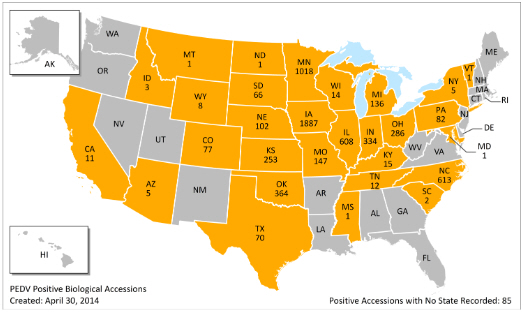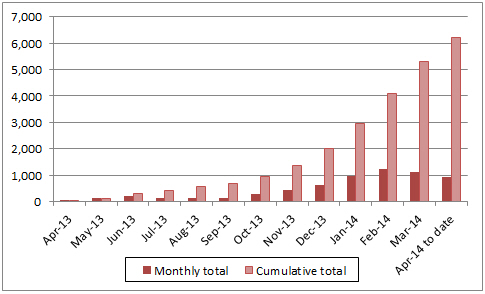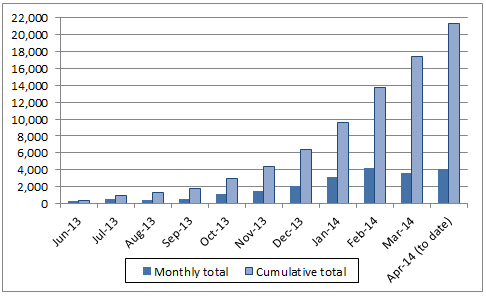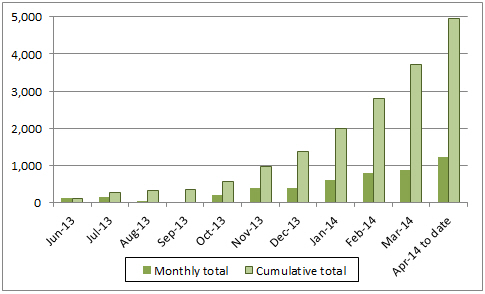



PED Update in US: 6,226 PED-positive Pig Farms
US - The total number of farms that have tested positive for the Porcine Epidemic Diarrhoea (PED) virus now stands at 6,226 in 30 states, writes Jackie Linden.The National Animal Health Laboratory Network (NAHLN) reports 204 positive accessions out of 779 tested at nine veterinary diagnostic labs for the week ending 26 April 2014.
The number of states reported to the NAHLN as having at least one confirmed case of PED now stands at 29. AASV reports, however, that cases have also been diagnosed in Virginia, which would bring the actual state count to 30.

Pig Farms Testing Positive for PEDv: 6,226
The total number of pig farm samples (termed 'laboratory biological accessions' in the official report) that have tested positive for the PED virus (PEDv) since April 2013 now stands at 6,226, which includes 924 for the month of April so far.
Since testing was fully reported in November 2013, 16,649 farm samples have been tested, of which 32 per cent have tested positive for the virus.

(since April 2013; data from NAHLN)
Results by age class
Suckling pigs
For the current month to date, 466 farms have been tested, of which 200 or 43 per cent were positive for PEDv.
Since testing was fully reported in November 2013, 2,225 farms have been tested, of which 1,315 or 50 per cent tested positive for PEDv.
Nursery pigs
For the current month to date, 446 farms have been tested, of which 155 or 35 per cent were positive for PEDv.
Since testing was fully reported in November 2013, 2,705 farms have been tested, of which 1,147 or 37 per cent tested positive for PEDv.
Grower/finisher pigs
For the current month to date, 495 farms have been tested, of which 100 or 20 per cent were positive for PEDv.
Since testing was fully reported in November 2013, 2,978 farms have been tested, of which 1,168 or 29 per cent tested positive for PEDv.
Sows and boars
For the current month to date, 319 farms have been tested, of which 56 or 18 per cent tested positive for PEDv.
Since testing was fully reported in November 2013, 1,296 farms have been tested, of which 549 or 30 per cent tested positive for PEDv.
Unknown age class
For the current month to date, 1,676 farms have been tested, of which 429 or 26 per cent tested positive for PEDv.
Since testing was fully reported in November 2013, 8,024 farms have been tested, of which 2,194 or 26 per cent tested positive for PEDv.
Results by state
According to AASV, the total number of states affected remains at 30.
The total number of positive accessions on this report (up to the week of 20 April) is 6,226.
Those states with 100 or more positive tests are: Iowa, 1,887; Minnesota, 1,018; North Carolina, 613; Illinois, 608; Oklahoma, 364; Indiana, 334; Ohio, 286; Kansas, 253; Missouri, 147, Michigan, 136 and Nebraska, 102.
For the most recent week (week of 20 April), most of the new cases - 52 of the 204 new positive results - were in Iowa, followed by Minnesota (36) and Illinois (30).
Also reporting one or more positive results were Colorado, Indiana, Kansas, Michigan, Missouri, North Carolina, Nebraska, Ohio, Oklahoma, Pennsylvania, South Dakota, Tennessee and Texas.
Individual Pigs Testing Positive for PEDv: 21,532
The total number of individual swine samples (termed 'biological samples' in the official report) since testing began in June 2013 now stands at 21,532.
For the current month to date, 18,925 samples have been tested, of which 4,090 or 22 per cent tested positive for PEDv.
Since testing was fully reported in November 2013, 75,345 samples have been tested, of which 21,532 or 25 per cent tested positive for PEDv.

(since June 2013; data from NAHLN)
Environmental Samples Testing Positive for PEDv: 4,962
The total number of environmental samples testing positive since testing began in June 2013 now stands at 4,962.
For the current month to date, 4,416 samples have been tested, of which 1,239 or 28 per cent tested positive for PEDv.
Since testing was fully reported in November 2013, 17,347 samples have been tested, of which 25 per cent tested positive.

(since June 2013; data from NAHLN)
Notes on the report
These data are collated by USDA APHIS VS NVSL National Animal Health Laboratory Network (NAHLN) and cited by the American Association of Swine Veterinarians (AASV) in a report dated 30 April 2014.
Veterinary diagnostic laboratories that have voluntarily reported PEDv and SDCv testing data to NAHLN include: University of Georgia–Athens, University of Illinois, Iowa State University, University of Illinois, Kansas State University, University of Minnesota, Nebraska Veterinary Diagnostic Center, Ohio Department of Agriculture, Purdue University, Michigan State University-Diagnostic Center for Population and Animal Health, South Dakota State University and North Dakota State University. This data does not include testing conducted at private diagnostic laboratories, at the NVSL, or for research purposes.
Data summaries provided in this report reflect the most current and complete data available at the time of report preparation; summaries in this report may differ from those provided in past reports.
PEDv data were collated and summarized by Iowa State University Diagnostic Laboratory from mid-April through mid-June, 2013; only summary data on positive samples are available for that time period. Totals for April 2013 only include testing after 4/16/2013.
NAHLN Laboratories began providing more granular information about PEDv testing starting the week of 6/16/2013, and USDA NAHLN began collating the testing data at that time. During the 2013 federal government shutdown, the University of Minnesota Diagnostic Laboratory collected and reported PEDv testing data (weeks of 9/22/13 through 10/6/13).
Data on PEDv-negative accessions and samples became available from all laboratories starting November 2013. Therefore, summaries “total number tested” and “percent positive” are only calculated for samples tested after November 1, 2013.
In general, a laboratory accession is a set of samples received at the laboratory in which the samples were collected at a single premises on a single day. Therefore, each laboratory accession represents a swine herd and each sample represents an individual animal tested for PEDv on a given date. Because multiple swine within a herd are often simultaneously infected, analyses often use the laboratory accession as the epidemiological unit of interest.
Age classes are defined as suckling (up to one month old or still on sow), nursery (one to three months), grower/finisher (three to eight months) and sow/boar (older than eight months).
A single accession can include samples from multiple age classes or samples tested in different weeks. Therefore, the same accession can be counted in more than one age class category or more than one testing week summary.
This report does not currently include results of testing on feed samples.
This report only includes PCR testing data for PEDv at this time, with additional testing types to be added to the report as information on the performance of new assays becomes available.







